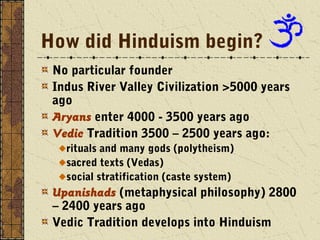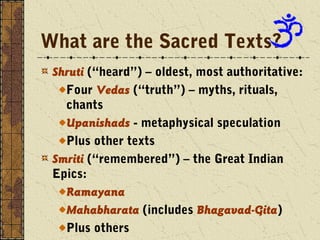Hinduism
- 1. What is Hinduism? One of the oldest religions of humanity The religion of the Indian people Gave birth to Buddhism, Jainism, Sikhism Tolerance and diversity: "Truth is one, paths are many" Many deities but a single, impersonal Ultimate Reality A philosophy and a way of life – focused both on this world and beyond
- 2. How did Hinduism begin? No particular founder Indus River Valley Civilization >5000 years ago Aryans enter 4000 - 3500 years ago Vedic Tradition 3500 – 2500 years ago: rituals and many gods (polytheism) sacred texts (Vedas) social stratification (caste system) Upanishads (metaphysical philosophy) 2800 – 2400 years ago Vedic Tradition develops into Hinduism
- 3. What are the Sacred Texts? Shruti (“heard”) – oldest, most authoritative: Four Vedas (“truth”) – myths, rituals, chants Upanishads - metaphysical speculation Plus other texts Smriti (“remembered”) – the Great Indian Epics: Ramayana Mahabharata (includes Bhagavad-Gita) Plus others
- 4. What do Hindus believe? One impersonal Ultimate Reality – Brahman Manifest as many personal deities True essence of life – Atman, the soul, is Brahman trapped in matter (“That art thou”) Reincarnation – atman is continually born into this world lifetime after lifetime (Samsara) Karma – spiritual impurity due to actions keeps us bound to this world (good and bad) Ultimate goal of life – to release Atman and reunite with the divine, becoming as one with Brahman (Moksha)
- 5. How does Hinduism direct life in this world? Respect for all life – vegetarian Human life as supreme: Four “stations” of life (Caste) - priests & teachers, nobles & warriors, merchant class, servant class Four stages of life – student, householder, retired, renunciant Four duties of life – pleasure, success, social responsibilities, religious responsibilities (moksha)
- 6. What are the spiritual practices of Hinduism? The Four Yogas - seeking union with the divine: Karma Yoga – the path of action through selfless service (releases built up karma without building up new karma) Jnana Yoga – the path of knowledge (understanding the true nature of reality and the self) Raja Yoga – the path of meditation Bhakti Yoga – the path of devotion Guru – a spiritual teacher, especially helpful for Jnana and Raja yoga
- 7. How do Hindus worship? Bhakti Yoga is seeking union with the divine through loving devotion to manifest deities • In the home (household shrines) • In the Temples (priests officiate) Puja – making offerings to and decorating the deity images Darsan – “seeing” the deity (not idol worship) Prasad – taking the divine within your own being through eating of food shared with the deity
- 8. Who do Hindus worship? – the major gods of the Hindu Pantheon Brahma, the creator god
- 9. Who do Hindus worship? – the major gods of the Hindu Pantheon Vishnu, the preserver god Incarnates as ten avatars (descents) including: Rama (featured in the Ramayana) Krishna (featured in the Mahabharata) (Each shown with his consort, Sita and Radha, respectively)
- 10. Who do Hindus worship? – the major gods of the Hindu Pantheon Shiva, god of constructive destruction (the transformer) Appears as Shiva Nataraj, lord of the dance of creation… and with his wife, Parvati, and son Ganesha
- 11. What about the goddesses? Devi – the feminine divine Saraswati, goddess of wisdom, consort of Brahma
- 12. What about the goddesses? Devi – the feminine divine Lakshmi, goddess of good fortune, consort of Vishnu
- 13. What about the goddesses? Devi – the feminine divine Parvati, divine mother, wife of Shiva
- 14. What about the goddesses? Devi – the feminine divine Durga, protectress Kali, destroyer of demons Plus about 330 million other deities
- 15. All these deities are but Manifest forms (attributes and functions) of the impersonal Brahman
- 16. And we too are manifest forms of God! “We are not human beings having spiritual experiences; We are spiritual beings having a human experience!” “That art Thou” Hinduism is about recognizing the all pervasiveness of the divine
- 17. Explore Hinduism on the Web: The Hindu Universe: Lots of information on Hinduism and the Hindu community on-line and around the world. Includes chat rooms and message board forums - www.hindunet.org The Virtual Hindu Temple: Contains some interesting and useful pages including: Discover Hindu Gods & Goddesses and FREQUENTLY ASKED QUESTIONS ABOUT HINDUISM. Also contains a gallery of deity images and a collection of links to Hindu sacred texts online and other sites related to Hinduism - www.rajdeepa.com/vmandir/vmandirindex.htm Hinduism for Schools provides basic, introductory info to teach primary and secondary level students about Hinduism - www.btinternet.com/~vivekananda/schools1.htm Created by Laura Ellen Shulman
















